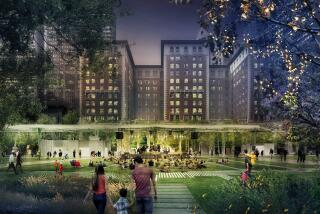L.A.’s Convention Center gamble
Anschutz Entertainment Group becomes the new manager of the Los Angeles Convention Center on Sunday, marking the largest and most significant privatization of a city asset in recent memory.
AEG will handle day-to-day operations, but the Convention Center itself will still be owned by the city. The center has been derided as a “white elephant” because it’s never lived up to its moneymaking potential and because it’s a big, white, boring building in an increasingly hip downtown.
Turning over the keys to a private operator probably won’t save the city money, given that it will be paying AEG as much as $350,000 a year for its management service. Rather, the hope is that private management, working more closely with the L.A. Tourism and Convention Board, will lure more conventions and more attendees who will spend money on food, drink, souvenirs and hotel stays, generating money for retailers and tax revenue for the city. That’s not unrealistic. Private operators can make quicker decisions to satisfy clients and to keep them coming back. Government operators are more constrained.
YEAR IN REVIEW: Ted Rall’s five best cartoons
Since Sunday is the first day of this public-private partnership, it’s too early to declare it a success. But if it works, it could be a model. City leaders should continue to look for more opportunities to privatize assets and services if doing so will save money, restore delivery or improve it — while allowing city employees and departments to focus on the government’s core mission. And that core mission, we believe, should be to protect the public’s common interests — safety and economic prosperity, for example — and its common assets, such as streets, parks and infrastructure.
In the depth of the recession, when the city was facing a $1-billion deficit and the prospect of bankruptcy, L.A. leaders began to seriously consider spinning off non-core assets to private managers. That’s when the Convention Center idea surfaced, and let’s face it, the city would never have entered such a major public-private partnership in good economic times.
Lack of money prompted the city to let a nonprofit group take over the never-opened Northeast Valley Animal Shelter and run it as a pet adoption center. But most of the other proposals died on the vine or shrank. The City Council quashed a plan to lease city parking garages to a private company in exchange for cash up front, although the city is still investigating the idea of a private operator. The City Charter was blamed for blocking an effort to have the nonprofit Greater Los Angeles Zoo Assn. take over operation of the city-owned zoo. GLAZA has now proposed taking over marketing and promotion, but unions are balking.
The city’s budget situation is much better but still bad. The city probably has to cut $25 million in spending by July 1, and it faces an estimated $242-million deficit in the coming fiscal year. There’s still a need to reduce the structural deficit. And it’s worth asking now: As the city’s finances improve and it starts repaving streets, trimming trees and fixing sidewalks again, should L.A. hire public employees to do it or contract with private companies? There’s still a window of opportunity in the budget crunch to make significant changes to the way L.A. does business.
More to Read
A cure for the common opinion
Get thought-provoking perspectives with our weekly newsletter.
You may occasionally receive promotional content from the Los Angeles Times.






